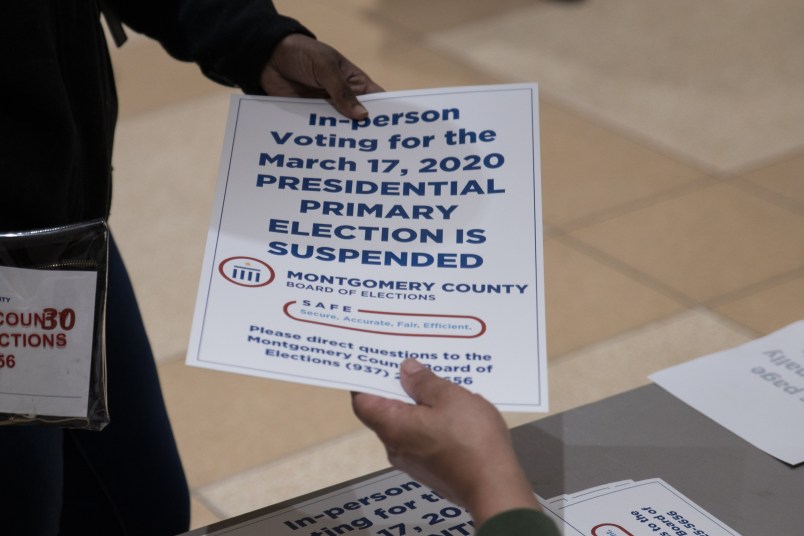Legislation concerning voting procedures for the delayed Ohio presidential primary has passed unanimously in the Republican-controlled state Senate and House and is bound for a signature from Gov. Mike DeWine (R).
However, the voting provisions, part of an omnibus bill dealing with coronavirus passed Wednesday, have incurred disapproval from a bevy of voting rights groups as well as from Secretary of State Frank LaRose, a Republican.
DeWine, who “applauded” the bill’s passage on Twitter, initially worked with LaRose and Lieutenant Governor Jon Husted (R) to lay out a plan for the primary, which was originally pushed back from March 17 to June 2 amid the coronavirus outbreak. The legislature’s new plan would significantly move that election day up to April 28.
In their original plan, postage-paid absentee ballot applications would have been sent automatically to all registered voters in the state who had not yet voted. Voters would have sent the applications in and received a ballot in a prepaid envelope to be postmarked by June 1, at the latest.
The bill passed by the legislature Monday, by comparison, is much more restrictive.
It requires the extra step of LaRose’s office designing and mailing out an informational postcard about how to obtain an absentee ballot, rather than sending out the applications automatically. Voters then must print out the application themselves, or ask their county board to send one, and rustle up postage to send it back. Only then would they receive a ballot and have to get it into the mail — all by April 27.
LaRose estimated that the postcards alone wouldn’t hit most Ohioans’ mailboxes until the second week of April.
Mike Brickner, Ohio director for All Voting is Local, condemned the legislature’s plan.
He predicted that county boards of elections would be flooded with absentee ballot requests, an issue compounded by their operating with a “skeleton staff.” He added that even if LaRose gets the postcards out to voters by the first week of April — a best-case “breakneck speed” scenario — unless the postal service, overwhelmed elections board and voters act quickly and completely accurately, many ballots will likely blow the deadline.
“I think the real question is if this could happen during optimal circumstances,” he said. “And we need to recognize that these are not optimal circumstances.”
LaRose also appeared unenthusiastic about the plan. “Today my friends in the legislature did the right thing by extending deadlines and postponing requirements on everything from taxes to school testing, so it’s disappointing that they’ve instead chosen to significantly reduce the time provided for Ohio to bring this primary to a close,” LeRose said in a statement, calling the original plan “preferable.”
He’d previously sent a letter to lawmakers telling them that it was not realistic to get ballots into the hands of voters and give them ample time to return them before June 2. He also warned of the unconstitutionality of forcing voters to pay for their right to vote, in the form of postage.
“No date before June 2nd is logistically possible,” LeRose wrote. “We simply cannot put a postage-paid absentee ballot request in the hands of each eligible voter and afford them reasonable time to cast a ballot any earlier. A plan that does not afford every Ohioan an opportunity to vote free of charge would be unconstitutional.”
DeWine said in a tweet that he “looks forward to signing it soon.”
In a Wednesday interview, though, he did express dismay that the legislature so significantly broke with the original plan.
“I’ll sign the legislation,” he told the Cleveland Plain Dealer. “It’s not what we wanted. I felt that Secretary of State Frank LaRose was absolutely correct when he said that it should be early June.”
The likely soon-to-be law may not stand: Brickner said that it violates the National Voter Registration Act, which mandates 30 days leading up to the election for voters to register. A constellation of voting rights groups in the state have already fired off a warning to LaRose about the discrepancy.
But if it does, a state which has already been whipped into turmoil this election season could be facing further chaos.
“The voter has to do everything perfectly, the board of election has to do everything perfectly, the mail has to be delivered perfectly for everything to work,” Brickner said. “And things don’t always work perfectly. This truncated timeline is really not good for voters.”
This story has been updated with a more extensive response to the legislation from Gov. DeWine.
Correction: The original version of this story stated incorrectly that, under a plan proposed by DeWine and LaRose, absentee ballots would be automatically mailed to voters. In fact, under the plan, absentee ballot applications, not the ballots themselves, would have been sent to voters.







They’re seeing what the courts will allow in the way of “voting” for the general.
No. No, no, no, no, no! This is not how you do it.
Among the most foreseeable of the unintended consequences of the coronavirus state of emergency is that the Republican Party will seize every opportunity to rig elections.
Once again, Rethuglicans working to suppress the vote. They might as well be considered thieves.
Very timely article.
Mr. Brickner, of the voting rights group, lays it out in stark terms:
“The voter has to do everything perfectly, the board of election has to do everything perfectly, the mail has to be delivered perfectly for everything to work … This … is really not good for voters.”
You’d almost think that Republicans wanted it to fail.